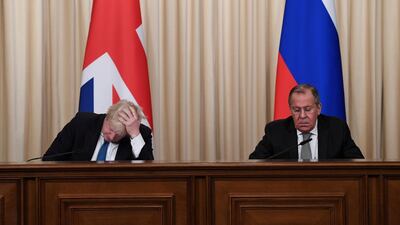British foreign secretary Boris Johnson has clashed publicly with his Russian counterpart over the issue of alleged meddling in the Brexit vote, as he admitted the UK's relations with Russia are "not on a good footing".
The first visit to Moscow by a UK foreign secretary in five years was intended to break the deadlock between the two countries.
But in an acerbic exchange, Mr Johnson and Russian foreign minister Sergey Lavrov traded blows over Russia’s alleged attempts to hack British elections, with both men accusing each other of being dishonest.
Speaking in front of journalists and diplomats, Mr Lavrov said Mr Johnson himself has acknowledged that there was no proof of Russian interference in the June 2016 vote to leave the EU.
"Not successfully, I think is the word," Mr Johnson immediately intervened.
Mr Lavrov retorted that his British counterpart needed to publicly argue with him to safeguard his reputation at home.
"Sergei, it's your reputation I'm worried about," Mr Johnson said as Mr Lavrov laughed. "You should recognise that Russian attempts to interfere ... haven't been successful."
Unwilling to yield ground, Mr Lavrov snapped: "Lack of action can never lead to any result," adding that Moscow was waiting to see Britain's proof of Russian meddling.
_______________
Read more:
Britain’s Johnson to warn Russia about its ‘destabilising activities’ on visit to Moscow
Facebook and Twitter to cooperate with investigation into Russian Brexit meddling
Theresa May to identify Russia as a ‘hostile state’ at EU summit
_______________
The Russian minister acknowledged that relations between the two countries are at a "very low point".
“It’s no secret that our relations are at a low point and that’s not at our initiative,” Mr Lavrov said. “We’ve noticed you and other western countries have your reasons for this and you prefer to speak about them publicly. We would prefer to discuss these issues directly, not in public through microphones.”
Mr Johnson agreed that it was “a difficult time” for UK-Russian relations, citing Russia’s involvement in the Ukraine, the western Balkans and cyberspace as key areas of disagreement.
However, he insisted “we mustn't let ourselves be defined by these problems," and expressed a strong desire to work together with Russia when national interests align.
The two nations need to cooperate on international crises, Mr Johnson said, such as preserving the Iran nuclear deal, addressing the threat posed by North Korea's nuclear programme, and helping bring peace to Syria.
Expanding trade, cultural and scientific exchanges and people-to-people contacts would also help to create trust and improved relations, he added.
"I'm a Russophile, a committed Russophile," Mr Johnson said, noting that some of his ancestors had Russian roots and that he was the first UK foreign secretary to be called “Boris”.
"Be in no doubt that I want to see an improvement in relations between our peoples, but that in no way diminishes the difficulties that we currently have in our relationship. We have to find a way forward."
Important areas of cooperation also include security preparations for next summer's World Cup in Russia. Thousands of British soccer fans are expected to travel to Russia, and Britain is already working with Russia to help ensure their safety.
Relations between Russia and the West have arguably sunk to their worst since the Cold War over Moscow's 2014 annexation of Ukraine's Crimean Peninsula and its support for pro-Russia separatist rebels in eastern Ukraine.
Allegations of Russian election-meddling have worsened the strain. Last month, Britain's Prime Minister Theresa May accused Moscow of "planting fake stories" and said it had carried out cyber-attacks on governments and parliaments across Europe.
Moscow has always denied growing accusations of meddling made by politicians in the West.
The 2006 poisoning of ex-Russian spy Alexander Litvinenko in London also has continued to cast a shadow over ties.
British Judge Robert Owen concluded in January 2016 that Mr Litvinenko, a former KGB officer, had been poisoned by two men acting at the behest of Russia's spy agency.
Mr Owen said he was certain two Russians with links to the security services had given Mr Litvinenko tea containing a fatal dose of radioactive polonium-210 at a London hotel. Russia dismissed the conclusion as unfounded.
Mr Lavrov said Russia never was shown the evidence behind the judge's conclusion and argued that Britain's refusal to have contacts with the main KGB successor agency, the FSB, hurts anti-terror cooperation.

